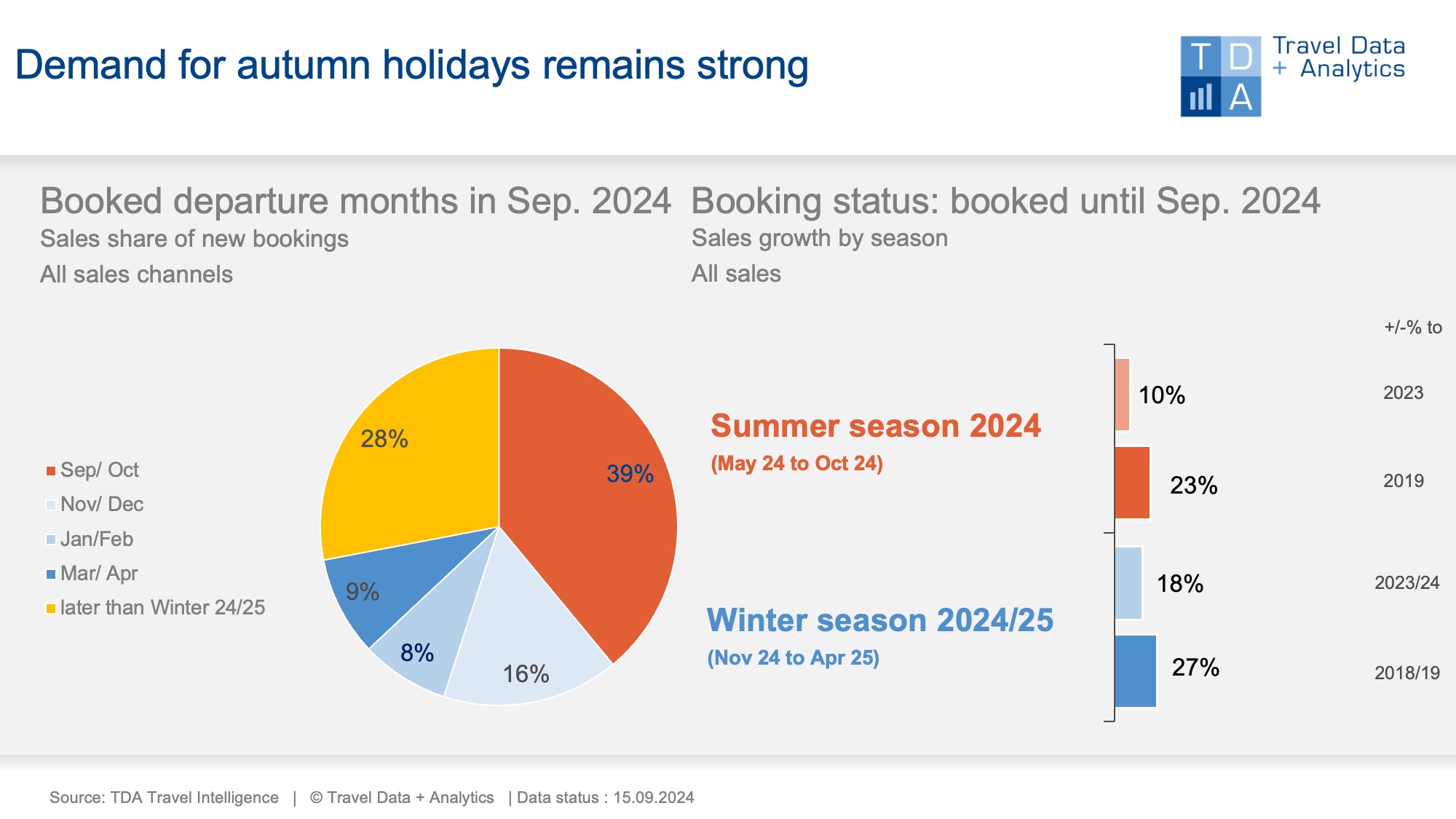Nuremberg, October 30, 2024 – The booking month of September 2024 was characterised by continued strong demand for autumn holidays and a huge increase in early bookings for the upcoming 2025 summer season, which are particularly strong in terms of sales. At the current booking status at the end of September, the current 2024 summer season already exceeds the final result of the previous year's season by 9 per cent. The 2024/25 winter season, which is due to start shortly, has lost 3 percentage 3 percentage points in growth compared to the previous month, but is still in a good position with an 18 per cent increase in sales compared to the previous year.
Autumn holidays are also very popular with German citizens in the booking month of September 2024: holiday trips booked at short notice for September and around twice as many for October not only account for the highest share of sales in the past booking month, it also show an 8 per cent increase in sales compared to the same month last year. This means that the 2024 summer season can maintain its cumulative growth of 10 per cent at the current booking level. The final result of last year's 2023 summer season has already been exceeded by 9 per cent (previous month:+4 per cent). September is proving to be the strongest travel month of the summer season as it draws to a close, both in terms of sales and bookings. The travel month of October is slightly weaker in absolute terms but shows stronger growth, followed by the travel month of May. In all three travel months, the number of holidaymakers booking package holidays by air exceeds that of the actual peak travel period in the summer months of June to August. ‘We are seeing a slight shift in holiday preferences this year towards the off-peak periods of spring and autumn. Holidaymakers are apparently preferring to switch to cheaper travel times outside the school holidays if they can or are avoiding the increasingly hot summer months in the Mediterranean region,’ explains Roland Gassner, Director Business Development at Travel Data + Analytics.
One third of monthly sales in September 2024 were due to bookings of winter holidays. Compared to travel years that were unaffected by special effects such as insolvencies or the pandemic, the share of winter sales remains below average. However, thanks to good early booking volumes, the 2024/25 winter season still recorded an 18% increase in sales compared to the previous year shortly before the start of the travel season. Compared to the previous month, growth has fallen by 3 percentage points. Winter bookings are already being displaced to some extent by holiday bookings for the upcoming 2025 summer season. As at the end of September, these accounted for 28 per cent of sales - a gain of 4 percentage points compared to the same month last year. Booking turnover from early summer bookers grew by a remarkable 28 per cent in September 2024.

Legend:
The chart shows the cumulative travel sales generated up to the end of September 2024 for the current winter season 2023/24 and the upcoming summer season 2024 in comparison to the previous seasons and the pre-corona level (summer 2019, winter 2018/19). TDA's analyses include both holiday bookings in traditional travel agencies and online on the travel portals of tour operators and online travel agencies (OTAs) with a focus on package holidays. The chart on the left shows the percentage of sales in the booking month of April accounted for by the individual travel months and seasons.
About TDA Travel Intelligence
Travel Data + Analytics (TDA) took over in spring 2019 the travel sales panel run by the Nuremberg market research company GfK since 2004. After the GfK data had been migrated to a new IT landscape, Travel Intelligence was set up as an independent solution with a self-learning database and associated analysis tool. The basis remains the booking data from stationary travel agencies and online portals that sell tour operator products. The requirements of tourism companies on a modern control instrument and evolving, increasingly dynamic questions can thus be mapped reliably and promptly, without giving up the core of a market-representative method that is consistently comparable over time. TDA = Current booking situation + individual product performance + new market opportunities.
Further information: Alexandra Weigand, alexandra.weigand@traveldataanalytics.de, phone: +49 (0)911 951 510 03